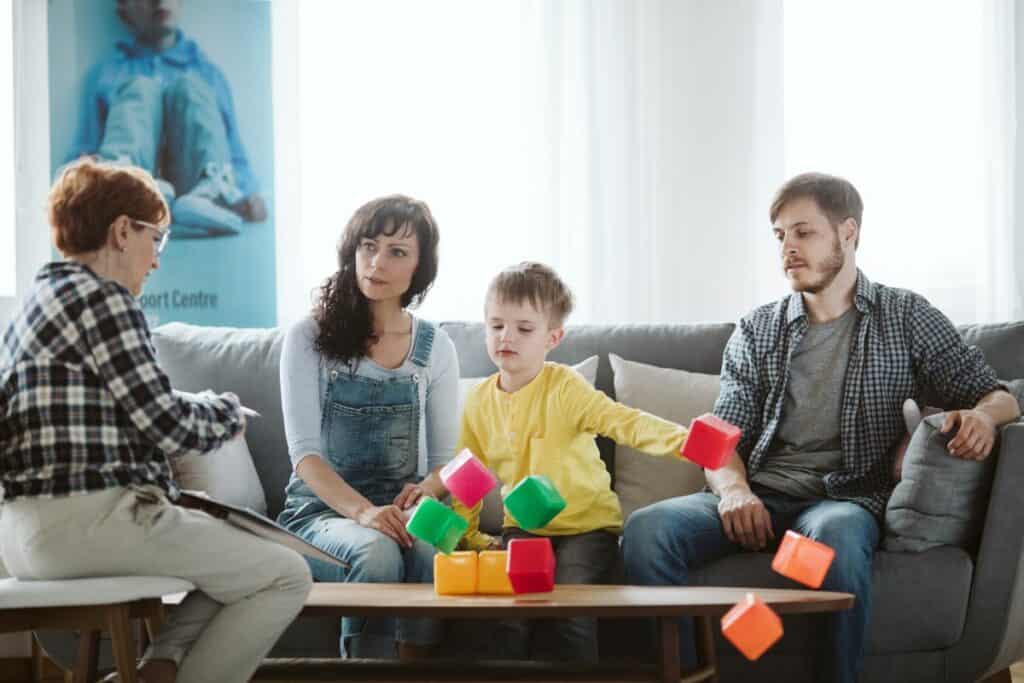Children’s anger management therapy has become an essential tool in helping young individuals cope with strong emotions and develop healthy communication skills.
Anger is a normal human emotion ranging from mild irritation to intense rage.
When children struggle to manage their anger, it can lead to difficulties in social settings, academic performance, and overall well-being.
Therefore, establishing effective anger management strategies early in life is crucial for fostering emotional resilience and building strong interpersonal relationships.
Assessing Children’s Anger

Anger is a universal emotion that all individuals experience, including children.
Understanding and assessing children’s anger is critical to supporting their emotional development and well-being.
While learning to navigate their emotions, children may exhibit anger in various ways that require careful observation and interpretation from different professionals.
Role of Pediatricians
Pediatricians play a crucial role in identifying and addressing children’s anger issues early on. They need to establish trust with both the children and their families for effective intervention.
Pediatricians can monitor a child’s development and behavioral patterns during routine checkups.
When they notice signs of anger issues or other emotional problems, they can provide guidance to parents on appropriate strategies for anger management and refer the child to a specialist, such as a child psychologist or a clinical psychologist, for a more in-depth assessment.
Role of Child Psychologists
Child psychologists are instrumental in assessing and treating anger management issues in children.
They utilize various methods to evaluate a child’s anger, such as observing their behavior, conducting interviews, and using standardized assessments.
These professionals are trained to understand the underlying causes of anger and develop tailored interventions for each child, often drawing from cognitive-behavioral approaches.
Child psychologists can also work closely with pediatricians and other mental health professionals to provide a comprehensive and multidisciplinary approach to children’s anger management therapy.
Therapists Specializing in Anger Management
Role of Clinical Psychologists
Clinical psychologists often receive referrals from pediatricians and child psychologists for more intensive work with children with anger issues.
They have specialized training in assessing and treating various mental health disorders, including anger management problems.
Clinical psychologists can provide more in-depth diagnostic evaluations and comprehensive treatment plans for children with more severe or persistent anger issues.
Techniques used by clinical psychologists may include cognitive-behavioral therapy, social problem-solving, and social skills training, which has been shown to address anger management problems in children effectively.
Collaboration with other professionals like pediatricians and child psychologists can enhance their ability to support children and their families in managing anger.
Therapeutic Approaches to Children’s Anger Management

There are several evidence-based approaches to children’s anger management therapy, such as behavioral therapy and cognitive-behavioral therapy (CBT).
Also, group therapy settings are commonly used, as children can learn from their peers and practice their new skills together.
Early intervention and comprehensive support systems in schools, homes, and communities play a key role in helping children develop healthy anger management skills and emotional regulation strategies that will benefit them throughout their lives.
Behavioral Therapy
Behavioral therapy focuses on teaching children appropriate ways to behave and respond to situations that elicit anger.
It emphasizes positive reinforcement, helping children to develop healthy habits and coping mechanisms.
Techniques used in behavioral therapy for anger management may include role-playing, modeling, and practicing positive responses to challenging situations.
This approach can benefit children who struggle with impulse control or aggression as it allows them to learn and practice new techniques in a safe environment.
Cognitive Behavioral Therapy (CBT)
Cognitive Behavioral Therapy (CBT) is a widely used approach for anger management, targeting both cognitive and behavioral aspects.
This method helps children identify underlying thoughts and beliefs contributing to angry feelings and reactions.
By addressing these cognitive patterns, children can work on reframing their thoughts and developing healthier ways of coping with anger.
In CBT, children are taught specific skills such as self-monitoring, cognitive restructuring, and problem-solving.
For instance, children might learn how to identify their triggers, assess their emotional reactions, and implement relaxation techniques.
They may also be trained in communication skills and assertiveness, empowering them to express their feelings more effectively and non-confrontational.
Ultimately, CBT aims to provide children with the tools necessary to manage and regulate their emotions, which is vital for their mental health and overall well-being.
Teaching Strategies and Skills

Navigating the complex landscape of emotions is an essential aspect of a child’s development, and teaching strategies and skills to manage anger forms a fundamental part of this journey.
Children, like adults, experience moments of frustration and anger, and guiding them to understand and cope with these feelings is a valuable life skill.
Communication Skills
Teaching communication skills is an essential part of children’s anger management therapy. These skills help children express their feelings and needs appropriately, thus reducing anger and frustration.
Techniques for improving communication skills can include active listening, encouraging open-ended questions, and modeling appropriate responses.
Consistency and clear expectations are also crucial for developing effective communication in children.
Moreover, offering praise when children communicate well can reinforce their newly acquired skills.
Emotional Regulation Skills
Another critical aspect of anger management therapy for children is teaching emotional regulation skills.
These skills help children identify and manage their emotions more effectively, enabling them to cope with anger and prevent outbursts.
Strategies for teaching emotional regulation can include deep breathing exercises, mindfulness techniques, and using positive self-talk.
By practicing these skills, children learn to recognize their emotional triggers and develop healthy ways to cope with anger.
Furthermore, reinforcing appropriate behavior and social skills contributes to improved emotional regulation in children.
Problem-Solving Skills
Problem-solving skills are also essential for managing anger in children. These skills help children identify the cause of their anger, analyze the situation, and develop appropriate solutions to resolve conflicts.
Teaching problem-solving skills can involve brainstorming, discussing possible solutions, and role-playing different scenarios.
By learning to approach problems logically and systematically, children develop the ability to control their anger and channel it into constructive actions.
Adults must maintain a consistent and supportive environment to help children learn and apply these skills effectively.
Impulse Control

Lastly, impulse control plays a significant role in children’s anger management therapy.
By learning to control their impulses, children can prevent anger from escalating and avoid engaging in aggressive behavior.
Techniques for teaching impulse control can include practicing self-awareness, setting clear boundaries, and implementing time-outs to allow children to calm down and regain control over their emotions.
Additionally, promoting positive social skills and consistently praising children for demonstrating appropriate behavior can help reinforce the importance of impulse control in managing anger.
Exercises and Activities for Anger Management
Anger is a natural emotion experienced by individuals of all ages, and cultivating effective strategies for managing it is a vital skill for personal well-being and healthy relationships.
Exercises and activities designed for anger management offer practical tools to navigate this powerful emotion in productive ways.
Incorporating relaxation techniques and cognitive restructuring activities into anger management therapy for children can contribute to healthier emotional development and improved interpersonal relationships.
Relaxation Techniques
Relaxation techniques are crucial in helping children manage their anger.
| Relaxation Technique | Description |
|---|---|
| Deep Breathing Exercises | Deep breathing can help kids regain control and reduce anger by calming the nervous system. |
| Guided Imagery | Instructing children to visualize a peaceful scene can assist in defusing anger and promoting a sense of calm. |
| Progressive Muscle Relaxation | By tensing and relaxing each muscle group, children learn to distinguish between feelings of tension and relaxation. This awareness helps children better recognize signs of anger and respond more effectively. |
Cognitive Restructuring Activities
Cognitive restructuring activities encompass various exercises designed to modify negative thought patterns and replace them with more constructive approaches.
| Cognitive Restructuring Activity | Description |
|---|---|
| Role-Playing | Role-playing is one such activity that can help children understand the perspectives of others and practice healthier responses to provocation. |
| Thought-Stopping | Thought-stopping is a useful cognitive restructuring strategy that works by interrupting maladaptive thoughts. Encourage children to identify negative thoughts associated with anger and replace them with positive or neutral thoughts. This can reduce angry feelings and help them find alternate ways to cope. |
| Problem-Solving Skills | Teach children to identify the root cause of their anger, brainstorm potential solutions, evaluate each solution, and implement the most effective option. By practicing these problem-solving skills, children can learn to handle anger-triggering situations more constructively. |
Frequently Asked Questions
How can parents help a child with anger issues?
Parents can help their children with anger issues by being understanding, patient, and supportive. They should model healthy ways to express and cope with emotions.
Listening to the child and validating their feelings is important, as is setting clear expectations and consequences for unacceptable behavior.
Parents can also use positive reinforcement and praise for efforts made to manage anger.
Creating a calm and organized home environment and incorporating cognitive-behavioral therapies could also help manage children’s anger issues.
What are effective therapies for children with anger problems?
Cognitive-behavioral therapy (CBT) is an effective treatment for children with anger problems.
CBT focuses on helping children identify and change negative thought patterns, develop problem-solving skills, and build healthy coping mechanisms.
Group therapy can also be an effective option, allowing children to learn from their peers in a supportive setting.
In some cases, exposure-based therapies, which encourage children to confront and process their feelings of anger gradually, could be beneficial.
How do you recognize signs of anger issues in children?
Recognizing signs of anger issues in children is crucial for early intervention.
These signs could include:
- Frequent outbursts
- Irritability
- Easily frustrated
- Excessively argumentative
- Physical aggression
- Difficulty calming down after becoming angry.
Additionally, a child with anger issues may have trouble maintaining friendships or experience academic difficulties due to their inability to regulate emotions.
What are some fun activities to help children manage their anger?
Fun activities can effectively help children manage their anger.
Some examples include deep breathing exercises, which can be practiced while blowing bubbles; physical activities such as running, dancing, or yoga; and art therapy.
Encouraging children to engage in role-play scenarios, use puppets or play therapy to express their emotions can also be a helpful way of teaching coping skills and anger management techniques.






